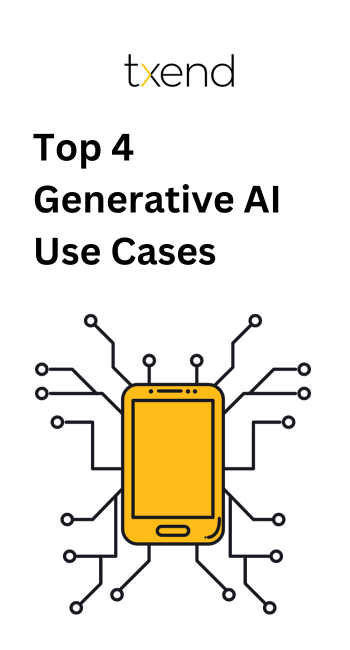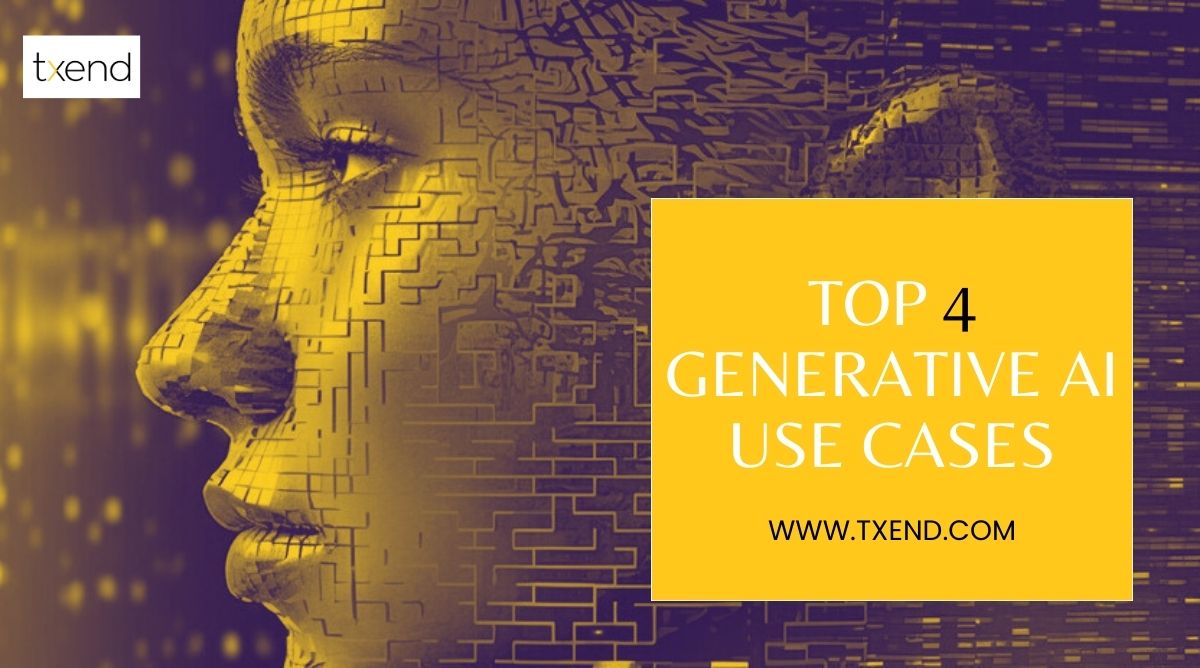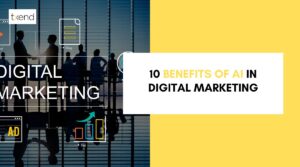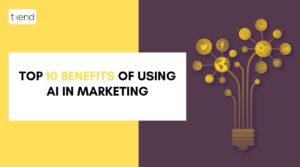Generative AI is becoming a disruptive force in the field of artificial intelligence with virtually limitless creative possibilities. By autonomously generating data, models, and behaviors, Generative AI is rewriting the rules of what’s possible in various industries.
This technology is not merely a novelty; it’s a powerful tool transforming how we approach problem-solving, creativity, and innovation. We are going to take a tour through the fascinating realm of generative AI use cases in this essay.
We’ll dive into the core concepts, tools, and technologies underpinning Generative AI and then delve into the practical applications reshaping industries.
From innovative advancements in healthcare to its versatile use cases in art, literature, and more, Generative AI’s potential is profound and ever-expanding.
Generative AI is more than a buzzword; it’s a transformative approach pushing the boundaries of what can be achieved.
Join us as we unravel the versatility, creativity, and innovation that this technology brings to the forefront, unveiling a future where machines become genuine co-creators, problem solvers, and sources of inspiration.

Key Takeaways
- Improving customer experiences involves enhancing interactions and services to meet individual needs and preferences, fostering satisfaction and loyalty.
- Generative AI boosts worker productivity by automating repetitive tasks and freeing up time for more strategic activities.
- Generative AI enhances creativity and content creation by providing automated assistance, generating ideas, and streamlining the creative process.
- Generative AI accelerates content optimization by automating tasks like SEO, content structuring, and keyword insertion, resulting in higher-quality content.
Top Use Cases Of Generative AI
Improve Customer Experiences:
A potent tool for improving client experiences in a number of ways is generative AI. It can examine enormous volumes of data to learn about the preferences and actions of its customers.
This data-driven approach enables banks to offer more personalized services, tailor product recommendations, and even predict customer needs, resulting in a more satisfying and engaging banking experience.
Additionally, Generative AI can power chatbots and virtual assistants, providing round-the-clock support, answering inquiries, and streamlining various banking tasks. This instant and efficient support further elevates the customer experience.
1: Chatbots and Virtual Assistants:
Advanced chatbots and virtual assistants that can converse with clients in a natural and human-like way can be created thanks to generative AI. These AI-powered agents are available 24/7 to address customer queries, guide them through processes, and provide information.
By doing so, they significantly improve response times, enhance customer support, and reduce the workload on human agents, ultimately leading to more efficient and satisfying customer experiences.
2: Agent Assist and Conversational Analytics:
Generative AI is employed in agent assist and conversational analytics to monitor and optimize customer interactions. It can analyze customer conversations, identify common issues, and recommend appropriate responses to human agents.
This aids in improving agent efficiency and ensures that customers receive accurate and consistent information, thus contributing to a smoother customer experience.
3: Personalization:
Generative AI excels in personalizing customer experiences. It can process vast datasets to identify individual customer preferences, behavior patterns, and needs.
This information enables banks to provide tailored services like personalized product recommendations and customized financial advice. The result is a more engaging and meaningful customer interaction, fostering loyalty and trust.
In summary, Generative AI enhances customer experiences in banking by providing personalized services, powering chatbots and virtual assistants for instant support, offering insights for agent assistance and conversational analytics, and creating a tailored banking experience.
This improves customer satisfaction and enables banks to provide more efficient and responsive services in today’s fast-paced banking environment.
Boost Employee Productivity:
Generative AI plays a crucial role in enhancing employee productivity across various industries. By automating tedious and repetitive operations, workers may concentrate on more strategic and high-value work.
Generative AI can analyze and generate reports, assist in data analysis, automate content creation, and streamline various processes, thereby saving time and reducing the risk of human error.
This automation improves efficiency and empowers employees to allocate their time and expertise to tasks that require creativity and critical thinking.
1: Conversational Search:
Generative AI’s conversational search capabilities transform how we find and access information. It enables users to interact with search engines, databases, or applications in a natural, informal manner.
This enhances search efficiency, as users can ask questions or make requests in plain language, and the AI system can understand and retrieve relevant information, making it easier for employees to access the data they need.
2: Code Generation:
The prominent Generative AI use cases can assist in code generation, a precious application in software development and programming. It can automatically generate code snippets or even entire programs based on user requirements or provided examples.
This accelerates the software development process and reduces the risk of coding errors, thereby boosting developer productivity.

3: Automated Report Generation:
Generative AI excels in automating the process of report generation. It can generate comprehensive and structured reports quickly and accurately by processing large datasets and information.
This is especially beneficial in fields such as finance, analytics, and data-driven decision-making, where automated report generation saves employees significant time and ensures the consistency and quality of reports.
In summary, Generative AI enhances employee productivity by automating tasks and processes, streamlining data retrieval through conversational search, accelerating software development with code generation, and expediting the creation of structured reports through automated report generation.
This technology empowers employees to work more efficiently, allocate their skills where they matter most, and ultimately contribute to increased productivity and innovation in their respective fields.
Enhance Creativity and Content Creation:
Generative AI is a powerful tool for boosting creativity and content creation across various industries. By automating repetitive and time-consuming content generation tasks, it frees up human creative resources to focus on more innovative and strategic aspects of content creation.
Generative AI can assist in generating text, images, videos, and more, while also providing inspiration and generating ideas. This not only streamlines the content production process but also enables content creators to explore new creative horizons.
1: Marketing:
Generative AI plays a pivotal role in marketing by assisting in content creation and personalization. It can generate persuasive ad copy, craft compelling email subject lines, and even create social media content.
By automating these tasks, marketers can quickly adapt to changing market conditions and reach a broader audience with personalized and engaging content.
2: Sales:
In sales, Generative AI can assist in drafting personalized sales pitches and responses to customer inquiries. It can generate email templates, proposal content, and even recommend strategies for sales conversations.
This saves sales representatives time and ensures they have access to relevant, compelling content that resonates with potential customers.
3: Product Development:
The Generative AI use cases can enhance product development by generating design ideas, creating product descriptions, and assisting in prototyping. It can also help brainstorm sessions and develop innovative concepts based on market trends and customer feedback.
This streamlines the product development process, facilitating faster ideation and efficiently bringing products to market.
In summary, Generative AI empowers creativity and content creation by automating routine tasks, providing content ideas, and assisting in various stages of content production.
This is particularly valuable in marketing, sales, and product development, where generating engaging and personalized content is essential for connecting with audiences, driving sales, and innovating new products.
Accelerate Content Optimization:
Generative AI significantly expedites content optimization processes. It can analyze and understand large volumes of content to provide suggestions for improving readability, search engine optimization (SEO), and overall quality.
This technology automates keyword insertion, rewriting, and content structuring tasks, leading to quicker and more effective content optimization.
1: Document Processing:
Generative AI is a valuable asset in document processing. It can swiftly analyze, categorize, and extract information from large document sets, streamlining document management and search processes.
Whether it’s archiving, searching, or summarizing documents, Generative AI saves time and ensures data accuracy in document-related workflows.
2: Data Augmentation:
Generative AI is crucial in data augmentation, particularly in machine learning and data analysis. It can generate synthetic data to augment existing datasets, enabling more robust model training and evaluation.
By creating additional data points, Generative AI enhances the accuracy and reliability of AI models, ultimately expediting data-driven decision-making.
3: Supply Chain Optimization:
In supply chain management, Generative AI offers advanced capabilities. It can forecast demand, optimize inventory levels, and assist in route planning and scheduling.
Analyzing many data sources helps organizations make informed decisions, reduce costs, and enhance supply chain efficiency, finally quickening the flow of products and services.
In summary, Generative AI accelerates content optimization by automating tasks like SEO, rewriting, and content structuring.
Its applications extend to document processing for efficient document management, data augmentation to enhance machine learning, and supply chain optimization for more streamlined and cost-effective supply chain operations.
This technology is invaluable for organizations looking to optimize their content and operations in a fast-paced, data-driven environment.
Industry-wise Use Cases of Generative AI
Healthcare:
Generative AI finds significant applications in healthcare, from generating patient reports and medical documentation to aiding in medical image analysis. It can assist in automating radiology reports, enabling faster diagnoses and freeing medical professionals to focus on patient care.
Additionally, Generative AI can support research and drug discovery by generating chemical compounds and predicting potential drug interactions.
Life Sciences:
Generative AI use cases can assist in protein structure prediction, drug discovery, and genomics research in the life sciences industry.
It can generate molecular structures and simulate biological processes, helping researchers design new drugs and gain insights into complex biological systems.
Financial Services:
Generative AI is instrumental in the financial sector for fraud detection, risk assessment, and financial report generation tasks.
It can analyze transaction data for anomalies and predict potential fraudulent activities. It also aids in automating the generation of financial reports and forecasts, facilitating data-driven decision-making.
Manufacturing:
Manufacturing companies can benefit from Generative AI for supply chain optimization, predictive maintenance, and product design.
It can generate production schedules, predict equipment maintenance needs, and assist in designing and optimizing manufacturing processes.

Retail:
Generative AI supports product recommendation engines and inventory management in the retail industry. It can analyze customer behavior and sales data to generate personalized product recommendations, enhancing the shopping experience.
Additionally, it aids in optimizing inventory levels to reduce carrying costs and ensure product availability.
Media & Entertainment:
Generative AI is transforming the media and entertainment sector by generating content, such as news articles, video scripts, and music compositions.
It can also be used in post-production tasks, such as video editing and special effects generation, streamlining content creation, and enhancing creativity.
Generative AI’s versatile applications in these diverse industries illustrate its potential to automate tasks, enhance productivity, and drive innovation.
As it continues to evolve, it promises to revolutionize processes and decision-making across various sectors, offering tailored solutions to each industry’s unique challenges.
Benefits of Generative AI
Automation and Efficiency:
Generative AI automates repetitive and time-consuming tasks, significantly improving operational efficiency. It can generate content, reports, and designs, saving organizations time and resources.
Enhanced Creativity:
Generative AI sparks creativity by providing suggestions, ideas, and generating content. It assists in creative fields like art, literature, and design, offering new perspectives and inspiration.
Data Augmentation:
In data-driven fields like machine learning, Generative AI augments datasets with synthetic data, enhancing the robustness of AI models and improving their accuracy.
Personalization:
Generative AI enables personalized content and recommendations in marketing, e-commerce, and more. It tailors offerings to individual preferences, enhancing customer satisfaction.
Faster Decision-Making:
By automating data analysis and report generation, Generative AI expedites decision-making processes. It provides insights and forecasts, allowing organizations to make data-driven choices more swiftly.
Streamlined Document Processing:
In fields like legal, financial, and research, Generative AI streamlines document processing by automating data extraction, archiving, and summarization.
Improved Content Optimization:
Generative AI accelerates content optimization processes by automating tasks like SEO, content structuring, and keyword insertion, resulting in higher-quality content.
Supply Chain Optimization:
In logistics and supply chain management, Generative AI aids in demand forecasting, inventory optimization, and route planning, reducing costs and improving supply chain efficiency.
Enhanced Healthcare and Life Sciences:
Generative AI aids in radiology report automation, drug discovery, and genomics research, ultimately accelerating medical diagnoses and scientific advancements.
Support for Creative Industries:
In media and entertainment, Generative AI generates content, scripts, and special effects, enabling faster content creation and enhancing creativity.
Risks of Generative AI
Bias and Fairness:
Generative AI models can inherit biases present in training data, potentially perpetuating discrimination or unfairness in generated content or decisions.
Misinformation and Fake Content:
Generative AI can be misused to create misleading or false information, which can be detrimental in areas like fake news, deepfakes, and fraudulent content.
Privacy Concerns:
The generation of personalized content may raise privacy issues, as AI systems could have access to sensitive user data, potentially leading to data breaches or privacy violations.
Ethical Dilemmas:
The autonomous nature of Generative AI may lead to ethical dilemmas, as it can produce content or make decisions that are morally ambiguous or objectionable.
Security Vulnerabilities:
The technology can be exploited to generate content designed for cyberattacks, including malicious code or phishing attempts.
Intellectual Property:
Content generated by Generative AI can pose challenges related to intellectual property rights and copyright, as it may be unclear who owns or has the rights to AI-generated work.
Regulatory Compliance:
Adherence to data protection and copyright laws can be challenging, as regulations may not have caught up with the rapid development of Generative AI.

Depersonalization:
While personalization is a benefit, it can also lead to depersonalization concerns, as human interactions may increasingly involve AI, potentially reducing the human touch in customer service or content creation.
Quality Control:
Ensuring the quality and accuracy of content generated by AI is a risk, as errors or inaccuracies in important documents, reports, or recommendations can have significant consequences.
Loss of Jobs:
The automation of tasks through Generative AI may result in the displacement of jobs in certain industries, leading to workforce challenges.
What does txend predict for the future of generative AI use?
The future of Generative AI in the US is undeniably promising. We may anticipate seeing a greater integration of generative AI across a range of industries as technology develops.
In healthcare, Generative AI is likely to play a pivotal role in areas such as medical image analysis, drug discovery, and patient record management, resulting in enhanced patient care and more precise diagnoses.
In the field of content creation, Generative AI is poised to transform the way we produce written content, art, music, and more. It will assist professionals in generating creative works efficiently, opening up new possibilities for content creators and industries.
Furthermore, Generative AI’s role in personalization will only grow stronger, enhancing the customer experience across e-commerce, marketing, and various service industries.
The US is likely to see more advanced recommendation engines, tailored marketing strategies, and personalized user interfaces.
However, along with the remarkable potential of Generative AI, challenges in areas like ethics, bias, and privacy must be addressed. Regulation and ethical guidelines will play a crucial role in ensuring responsible AI development.
FAQ’s
The sudden hype about generative AI is driven by its demonstrated ability to create, innovate, and automate tasks across various industries, offering transformative potential and sparking interest in its limitless applications.
Yes, crafting a usage policy for generative AI is essential to establish guidelines, ethics, and responsible use.
You should start with generative AI by gaining a solid understanding of the fundamentals, exploring available tools and resources, and choosing a specific application area or project that aligns with your interests and goals.
Generative AI has a significant impact across industries, notably healthcare, marketing, finance, and content creation.
Conclusion:
In conclusion, Generative AI has emerged as a transformative force, reshaping the landscape of innovation and problem-solving across numerous industries. It is clear from our exploration of the top 4 applications for generative AI that there is no end to the technology’s potential.
From automating content creation to enhancing decision-making processes, this technology is empowering organizations to achieve new heights of productivity, efficiency, and creativity.
Use cases for generative AI go beyond fads; they signify a fundamental change in the way we tackle difficult problems. The benefits are far-reaching, from accelerating content optimization to streamlining supply chain operations. However, it’s vital to tread responsibly, addressing potential risks such as bias and ethical dilemmas.
As we move forward, the continued evolution of Generative AI holds the promise of addressing even more complex challenges and pushing the boundaries of what’s possible.
It’s a future where machines become creative co-collaborators, aiding us in diverse fields, from healthcare to content creation. The journey of Generative AI has only just begun, and its impact on our world is bound to be profound, changing the way we work, create, and innovate.



